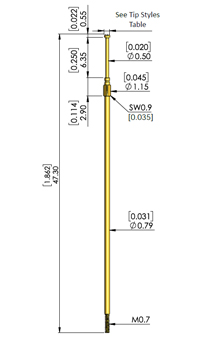Spring Contact test probes are equipment which is used as test
connector-cable systems. These equipments create an electrical connection
between the object to be tested and the testing system. Primarily deployed for
electrical testing of connectors, printed circuit boards, cables, and various
other electrical components and assemblies these instruments prove instrumental
in the connection between two electrical circuits or boards.
These contact probes are
made up of a tubular barrel, a spring and a plunger. There are many varieties
of tip styles and different spring pressures that ensure the best contact with
the test surface.
Benefits of Spring Contact Test Probes
• Small initial outlay
• Contact can be changed quickly
• Ideally suited for signal lines and
currents
• Contact Spacing from 0.4 mm
• Low maintenance costs
• Available with floating mounting on request
• Extensive standard product range.
These probes are available for various applications:
Used as a threaded probe to provide a secure fit.
Used for the test of wire harnessing.
Used for high current applications and designed for
very small probe resistance.
These probes can be used as special probes with
integrated switch elements, mainly used for presence.
Radiofrequency probes – Special spring contact
probes are used to transmit high-frequency signals.
Typical Tip Styles and Applications of Spring
Contact Test Probes –
Conical Tip Style: Universal tip style with
different angles for contacting solder pads and holes.
4-point Crown Tip Style: For pad surfaces and
soldered pins.
Concave: You can use these concave styles in smooth
contact of pins and wire wrap posts.
Step Probes Tip Style: For the position and
presence tests of connectors.


